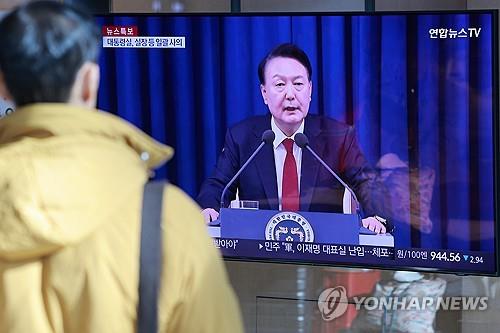- California Assembly OKs highest minimum wage in nation
- S. Korea unveils first graphic cigarette warnings
- US joins with South Korea, Japan in bid to deter North Korea
- LPGA golfer Chun In-gee finally back in action
- S. Korea won’t be top seed in final World Cup qualification round
- US men’s soccer misses 2nd straight Olympics
- US back on track in qualifying with 4-0 win over Guatemala
- High-intensity workout injuries spawn cottage industry
- CDC expands range of Zika mosquitoes into parts of Northeast
- Who knew? ‘The Walking Dead’ is helping families connect
S. Korean conglomerates monitoring business environment uncertainties from lifted martial law
Major South Korean conglomerates kept busy Wednesday trying to evaluate their business conditions amid uncertainties in the wake of a short-lived declaration of emergency martial law that sent ripples through the financial market.
Key players in the business sector, including Samsung Group, SK Group and LG Group, held emergency meetings to assess the impact of the political turmoil on their operations.
SK’s Supex Council, the group’s highest decision-making body, convened a meeting with chief executives from key subsidiaries, while LG also held an emergency strategy meeting to monitor financial market developments.
LG employees at the group’s headquarters near the National Assembly in Seoul were advised to work remotely due to possible political unrest in the area.

Major firms in the car, steelmaking and shipbuilding industries also held emergency meetings to monitor possible effects from the martial law bid.
Hyundai Motor Group, POSCO Holdings and HD Hyundai Heavy Industries checked potential risks on its business from a plunge in South Korean currency and increased volatility in the stock market.
The Korean won tumbled to the lowest in more than two years Wednesday, quoted at 1,410.1 won per dollar as of 3:30 p.m., while the benchmark Korea Composite Stock Price Index dipped nearly 1.5 percent to close at 2,464.
“Given that South Korea is a heavily export-dependent economy, the political turmoil has negatively impacted the financial market’s external credibility,” an official at a key conglomerate said.
The official added, “Political instability should not disrupt economic stability.”
An official at a retail company also expressed concerns that the martial law fiasco could hurt the increasing popularity of Korean food and cosmetics overseas.
Major lobby groups were also busy assessing the martial law impact on South Korean businesses. The Korea Chamber of Commerce and Industry held an emergency meeting to discuss ways to ensure a stable business environment for companies.
“We aim to work closely with economy-related government ministries to ensure a stable environment for businesses,” a chamber official said.











